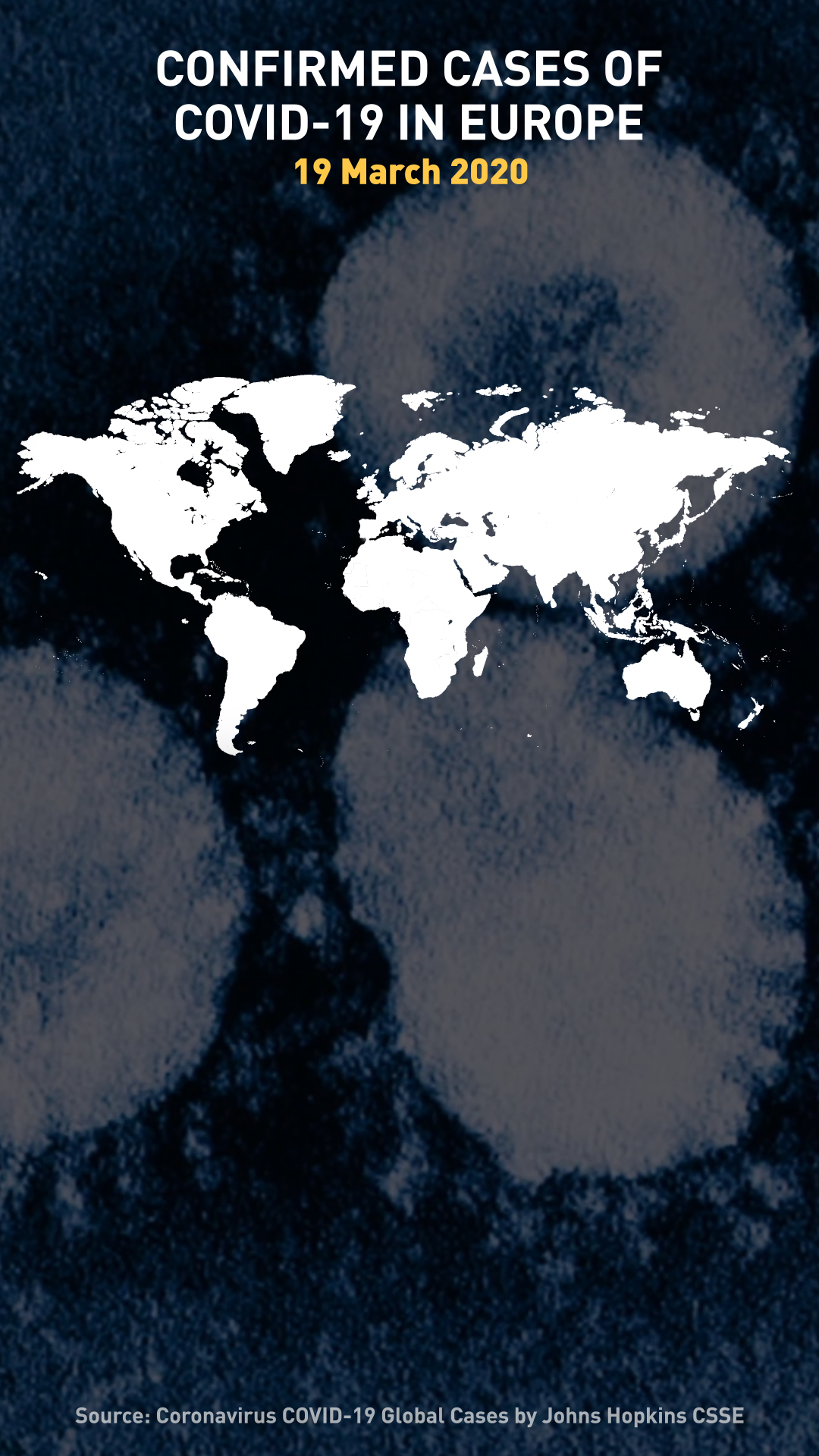TOP HEADLINES
More people have now died from COVID-19 in Italy than in China.
Italy, with a population of 60 million, has recorded at least 3,405 deaths, or roughly 150 more than in China — a country with a population over 20 times larger.
- The EU's Brexit negotiator Michel Barnier has tested positive for coronavirus
- The UK braces for virtual shutdown of London as underground train stations across the capital close and tougher measures are planned
- Up to 20,000 British military service personnel to be put on standby, the defence ministry says
- Hungary to deploy military personnel to 140 state companies providing critical services during the pandemic
- Germany deploys the army to help treat the sick and assist police and local authorities
- Russia (147 cases) reports first death from the virus, a 79-year-old woman with underlying health issues
- France's 15-day lockdown could be extended, says interior minister
- German finance minister tests negative for the coronavirus on Thursday
- Austrian province of Tyrol imposes lockdown until 5 April
- Slovenia (286 cases) to impose a ban on socializing in public spaces from Friday and proposes a delay in bank loan repayments for the affected
- No new cases reported in China, but Beijing hit by record number of imported cases
- Australia to ban all non-citizens and non-residents from entering the country from 9pm on Friday
- Tesla's Elon Musk offers to make ventilators amid shortage
00:37

By Ross Cullen in Paris
The death toll from the coronavirus outbreak in France has risen to 264 people, an increase of 89 fatalities in the past 24 hours.
There was also a rise in the number of people testing positive for the virus to more than 9,000. While 900 people are currently being treated in intensive care.
The president has called for greater financial solidarity in Europe, as France continues its state of lockdown, with people only being allowed out of their houses for a handful of specific reasons.
Parliament is considering an urgent bill that would impose a "state of health emergency."
With 18 members of parliament testing positive so far, exceptional arrangements have been made so that debates can be held in the presence of a very small number of MPs.
01:38

By Andrew Wilson in London
Londoners woke up to the news that 40 underground train stations will be closed until further notice, while other transport services may be limited, as Prime Minister Boris Johnson mulls tougher measures to tackle the coronavirus crisis.
The news followed Wednesday's big announcement by the government that all UK schools and universities will stay shut once the gates close on Friday.
It was initially understood that only Scotland and Wales would be closing schools, but by the time it came to Johnson's press conference at the end of the day, the decision was UK-wide.
This immediately raises concerns about childcare for key workers, particularly those in the health sector, but the prime minister said he believed the government would be able to help with that, though he wasn't clear how.
Even while the government made this announcement, ministers elsewhere were acknowledging there are discussions about closing down London.
Health experts say the pandemic is more advanced in the capital than in the rest of the country and that more draconian measures will almost certainly be required to combat that.
A lockdown of the city would mean all businesses closing apart from selected food stores and pharmacies. It would also probably mean restrictions on the number of people allowed to leave their homes at any one time.

Up to 40 of London's underground stations have been closed. /Isabel Infantes/AFP
Up to 40 of London's underground stations have been closed. /Isabel Infantes/AFP
By Ira Spitzer in Berlin
Germany has 12,327 confirmed coronavirus cases and 28 deaths as of Thursday, 09:30 GMT.
The country's largest airline, Lufthansa, says it will cut 95 percent of flights – grounding 700 planes – and CEO Carsten Spohr reiterated calls for state aid.
Traffic has slowed to a standstill at the German-Polish border due to Polish health controls designed to limit the spread of the virus. The tests can take up to 30 minutes per driver, many of whom are truck drivers transporting goods. Traffic was backed up for 40 kilometers on Wednesday evening.
Germany's government wants to bring back 20,000 German nationals from Egypt this weekend as part of a $55 million program to repatriate German tourists stranded due to travel restrictions. On Wednesday, 7,500 German tourists from various countries were flown back.
In a televised address on Wednesday evening, Germany's chancellor, Angela Merkel, called the outbreak the country's biggest challenge since World War II.

German chancellor Angela Merkel addresses nation on Wednesday, calling the outbreak the biggest challenge since World War II. /Uta Tochtermann/AFP
German chancellor Angela Merkel addresses nation on Wednesday, calling the outbreak the biggest challenge since World War II. /Uta Tochtermann/AFP
- The European Central Bank launches a 750 billion euro ($813 billion) emergency bond-purchase scheme to protect the eurozone's economy
- The Pan-European STOXX 600 index was up 0.5 percent on Thursday morning, edging higher from near seven-year lows
- The UK's FTSE 100 edged higher by 0.7 percent, in a choppy start on Thursday
- German carrier Lufthansa says the airline industry may not survive without state aid if the coronavirus pandemic lasts for a long time
FROM OUR GLOBAL COLLEAGUES
- WHO official warns against use of 'Chinese virus'
- COVID-19 Global Roundup: Everything you need to know
CGTN Europe has been providing in-depth coverage of the novel coronavirus story as it has unfolded. Here you can read the essential information about the crisis.